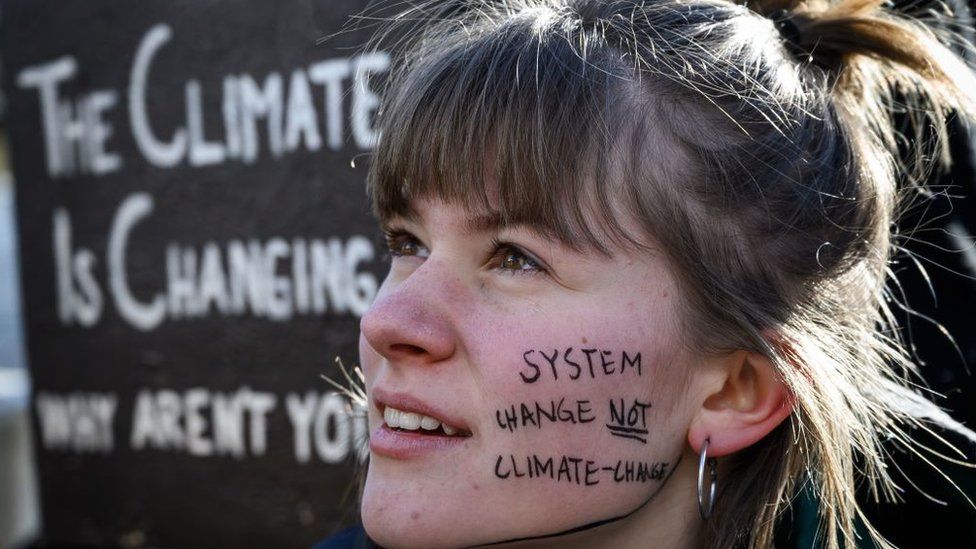Climate strike: Why are students striking and will it have an impact?
- Published

Are the UK's school strikes for climate change the moment that British youth finally wakes up to the "climate emergency"?
It may not represent a paradigm shift just yet, but the speed and scale of this young person's movement does make it feel more than a momentary splutter of impotent anger.
Ever since the then 15-year-old Swede Greta Thunberg decided to stop going to school on Fridays last year and instead protest outside the Swedish parliament, there has been a rapid expansion in similar activities in many parts of the world, especially in Europe.
Tens of thousands of schoolchildren in Belgium, Germany and other locations have cut classes and taken to the streets to call on governments to take urgent action on climate change.
Now young people in the UK are due to join them, determined to affect change on the issue that they feel is most germane to their future - the impacts of rapidly rising temperatures on an ever more crowded planet.
Greta's memorable phrase that we "cannot solve the crisis without treating it as a crisis", reflects the thinking of many, frustrated with the slow pace of progress.
That sense of crisis has been affected by the Intergovernmental Panel on Climate Change (IPCC) report on the impacts of global temperature reaching 1.5C, released last October.
'I'm standing up for our planet'
"We are doing this because we feel that climate action really needs to happen after the IPCC report," said Lottie, 17, who says she will join a school protest in London.
Speaking to the BBC, she said: "We've been told we have to take serious action and have just 12 years to cut our carbon emissions in half. As the young people who are going to be most affected by the fact that no-one is taking any action on climate change - this is our entire future.
"We can't vote yet and this is one of the most effective ways of making our voices heard."
Last year also brought a wide range of impacts including heatwaves and forest fires that scientists say were made worse by climate change.
All the while, the emissions that are driving up temperatures continue to go up, not down.
In the face of this continuing catalogue, the actions taken by governments seem rather limited, much to the frustration of scientists and campaigners.
Students contrast the slow pace of tackling climate change with the fact they have managed to get a movement going to organise a UK-wide strike in only four weeks.
What are the students hoping to achieve by striking?
According to the UK Student Climate Network, there are four key demands.
They want the government "to declare a climate emergency", and inform the public about the seriousness of the situation.
They also want the national curriculum reformed to include "the ecological crisis as an educational priority".
To fully include young people in decision-making, especially about issues related to climate change, they are calling on the government to lower the age of voting to 16.
These goals are being supported by a group of around 200 UK academics, who have written to a national newspaper to say they stand in solidarity with the strikers.
"With the dilution of citizenship education in recent years, this is an important opportunity for schools, colleges and universities to support active citizenship and political engagement," said Molly Scott Cato, the Green Party MEP who signed the letter, who is also a professor of green economics, at the University of Roehampton.
"Far from being disengaged, these strikes demonstrate that many young people do care passionately about our planet and the welfare of our neighbours across the world. Our politicians should pay attention and deliver policies that will safeguard future generations."
So will it have an impact?
Young people were far, far more visible at last December's key UN climate meeting in Katowice, Poland. Their energy and demands for speedy action marked a significant change from previous events.
Similarly in the US, we are seeing demands from young people for political action on climate change, forcefully represented by Democratic congresswoman Alexandria Ocasio-Cortez. She is the driving force behind the Green New Deal, a radical climate plan that would see the US decarbonise in only 10 years.
In Europe the school strikers are also making a powerful impression.
"They have put the climate issue on the public agenda," said Conner Rousseau, a spokesperson for the Flemish Socialist party in Belgium.
"They've forced all of the Belgian political parties to take a stand on the climate issue. We have elections in May, it will be one of the main themes."
Observers believe the same thing can happen in the UK.
"If the government is serious about winning over the next generation of voters, then they need to heed their most pressing concerns," said Richard Baker, from Christian Aid.
"But more importantly they are sparking a national debate, they are forcing teachers, parents and politicians to re-evaluate the issue of climate breakdown and, what is most important, while lifting our gaze beyond just immediate short-term national concerns."